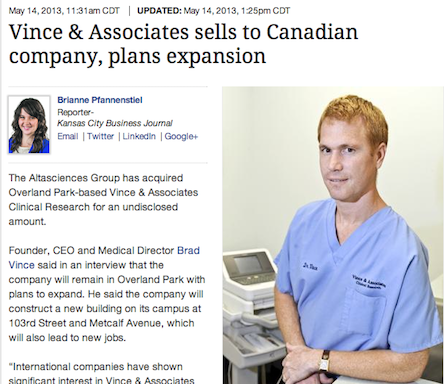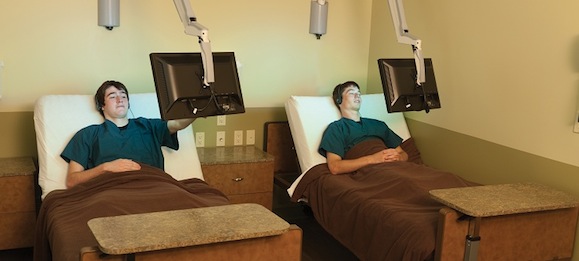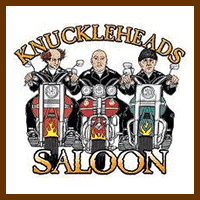 “Inquiring minds want to know…
“Inquiring minds want to know…
Given the discussion and controversy surrounding Vince & Associates over-the-top holiday lights display on Metcalf near 103rd Street, the question is, who or what in the heck is Vince & Associates anyway?
“They pay for people to stay there and let the drug manufacturers test their new drugs on the,” says KCC’s Jack Poessiger. “They used to advertise on KY to get young people who need the money and were willing to be tested on the drugs for money.
“One time (KY deejay) Larry Moffitt made an on-air crack on one of (Vince’s) commercials and he said, ‘Yeah, come by and be a guinea pig for us’ and they pulled their ads on the station.”
Somewhat obviously, Vince – was bought out this past year by a Canadian company – is far from alone in trafficking in human guinea pigs for drug company testing.
 Vince just has snazzier outdoor lighting, a waterfall and a tres conspicuous location.
Vince just has snazzier outdoor lighting, a waterfall and a tres conspicuous location.
And while Vince’s website stresses the precautions it takes using the “Physician Research Model of operation where study teams are led by highly experienced Principal Investigators intricately involved in all aspects of the clinical trial process,” the practice of testing new, unproven drugs on humans continues to raise eyebrows.
“Of course, no clinical trial is 100 percent safe,” writes Bambi Turner on the Discovery Channel website. “There’s always a risk that the prescribed treatment may not work, or even worse, that it can lead to serious health problems or even death…
“Although clinical trial-related deaths are extremely rare, all participants should take the time to review the potential dangers associated with each trial before agreeing to participate. For many, this comes down to weighing the benefits of taking part against the risks that something could go wrong. Patients with serious health problems may be willing to test experimental medications based on the hope that these drugs can improve their quality of life. People who are simply looking for a way to earn cash may be willing to participate only in relatively benign tests, as the risks of certain trials could outweigh the rewards for these participants.”
 In part the controversy revolves around paying money to people who may be in dire financial straights.
In part the controversy revolves around paying money to people who may be in dire financial straights.
“I’ve heard of people getting as much as $5,000 and you sign your life away when you go in there,” says one source who asked not to be named. “I had a friend, an older gal, who didn’t have much money – she gets about $800 a month in Social Security – and that’s how she supplemented her income. She made $8,000 one year, but that wasn’t with Vince, it was with another company.”
A few caveats for those attracted to Vince’s bright lights, fancy suites, pool tables and pinball machines and the potentially big bucks:
“Clinical trial participants should also be aware of the potential risks associated with different phases of these trials,” Turner cautions. “In the U.S., Phase I trials are typically the most dangerous. In a Phase I clinical trial, researchers try out a new drug or treatment on humans for the very first time. This phase is preceded by research and animal testing, but it still exposes test subjects to any number of unknown risks.
“Another way to mitigate risk when choosing whether to take part in these trials is to be on the lookout for conflicts of interest. The FDA warns that some medical staff receive financial rewards when they sign people up for clinical trials [source:FDA]. This could lead workers to accept candidates who may not be the best choices for a particular study.”
“It’s clear from the start that there is a deep conflict of interest in pharmaceutical companies sponsoring trials on their own drugs,” adds John LaMattina in Forbes. “Industry sponsors 90% of published clinical trials. A worrying statistic given that…industry-sponsored trials are four times as likely to produce positive results than independently run experiments.”
LaMattina notes that pharmaceutical industry critic, Dr. John Abramson, said this following on the Dr. Oz Show:
“About 85% of clinical trials are now funded by the drug industry. They own that data. The docs don’t understand that they are getting a selected, filtered version of what the information is.”
“I have personally witnessed the response of the general public when they hear about this,” LaMattina continues. “They are shocked and outraged. ‘How does the government and the FDA allow this to happen?’ is a common response. But who SHOULD be funding these trials? The government cannot possibly do this. The entire biopharmaceutical industry spends hundreds of billions of dollars annually on its clinical trials. Bycomparison, the entire National Institutes of Health budget is only about $60 billion. Funding major clinical trials of experimental medicines would bankrupt the NIH and other such institutions.”
 The type of folks who roll the dice with Vince & Associates and similar businesses?
The type of folks who roll the dice with Vince & Associates and similar businesses?
“Roberto L. Abadie, a visiting scholar in the health-sciences program at the Graduate Center of the City University of New York, spent a year living in youth hostels and group houses in Philadelphia, trying to get a sense of why volunteers do what they do and how they understand their risks,” writes David Glenn in the Chronicle of Higher Education.
Abadie’s study includes two types of medical volunteer.
“First, he describes transient, economically struggling people who travel from place to place in search of lucrative trials. These volunteers are often less educated and more socially isolated…Second, Mr. Abadie spent months at an HIV clinic where patients were participating in long-term trials to determine the effectiveness of new drug combinations…the HIV patients knew they had a personal stake in the development of new drugs, and the financial compensation they received was much smaller…those volunteers seemed to reap psychological gains.”
Which beings us back to the riskier Phase 1 trials Vince categorizes under the heading, “early development trials.”
“Mr. Abadie is more ambivalent about the wisdom of participating in Phase 1 trials,” Glenn writes. “Most of the volunteers he spent time with tend to say—naïvely, in his view—that the drugs will ‘wash out’ of their systems within a week after the experiments. That may be true in most cases, but some drugs can accumulate in the liver. There may also be unknown risks associated with participating in many trials over a lifetime.”
So what kind of guy type erects a giant waterfall outside his building, festoons it with Christmas lights for the holidays and employs fancy pool tables, pinball machines and the like to attract the so-called guinea pigs?
“Vince is a little flashy,” says the source. “He drives Ferrari’s and Maserati’s. And he’s like a Mike Babick kind of guy – he just loves the Christmas season. It’s more from his heart.”









Vince may be related in some way to Glaze.
I’ve done a few of these, mostly flu vaccines and what not. pretty painless and easy money.
Hearne….there are actually a cult of people who live by doing these experiments.
They go from one experiment to another and are paid pretty large sums of
money to participate.
I talked with one young man who was trying to get into a program that paid
$17,000 to stay in bed for a month….I believe it was for nasa to see what
not moving for a month would do to the body.
Its crazy…but there are seriously thousands of people who participate
in mutlitple tests and make their expenses by taking part in these studies.
There’s a long disclaimer that they have to sign that crazy for anyone to
sign.
but…they pay their rent/car payments/food/kids expenses from the
money they get….this kid told me he got $3500 for a 10 day study…
andplayed pool most of the time while he hung out with others who did
it for the money….
crazy things going on!!!!!
I read about people who travel the country making bank by volunteering for these “trials” – one after another after another.
Seems like the businesses hiring these people would maybe have some concerns for their testing, given that some of their subjects have so many different drugs coursing through their bodies.
True confession; I gave blood a time or two in college to raise a little cash and thought about some of the deals I’ve seen advertised in years gone by in the Star. Never pulled the plug though.
However, if I was dying of some disease and the only way I could try some Hail Mary drug was via one of these guinea pig deals, it would be very tempting.
It must be quite lucrative for Vince and other companies. Think how much the drug companies must pay them in order for them to shell out big bucks to – I dunno – patients, build expensive, exotic facilities like Vince’s, hire all those “doctors” and rummage around in Ferraris and the like.
I don’t know exactly how long Vince has been around but the website brags about more than a decade, which doesn’t sound very long to me.